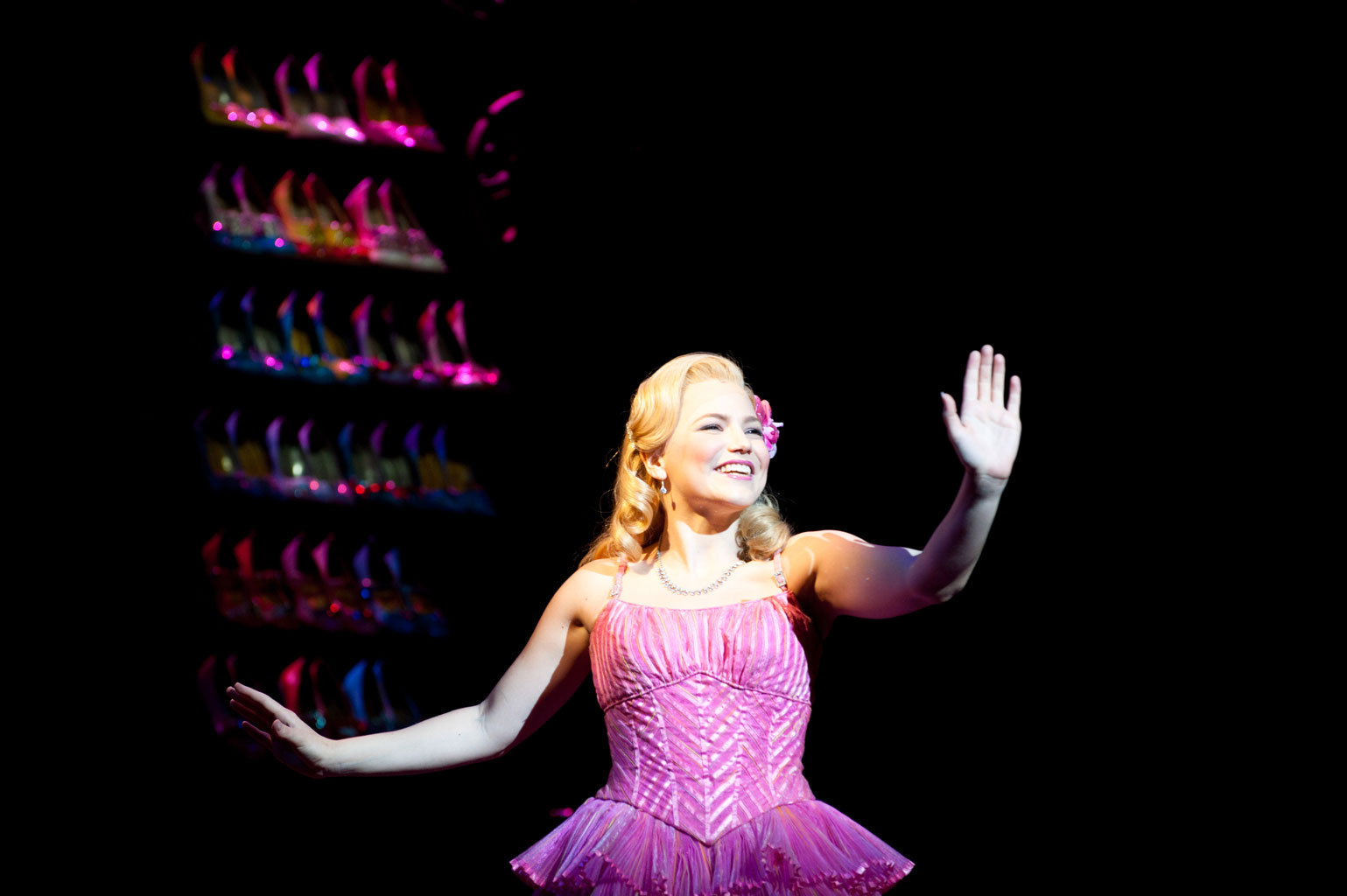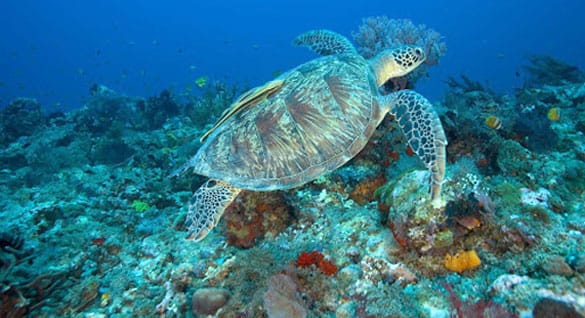
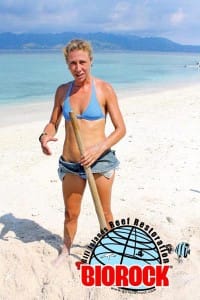 On Day one it was love at first sight with the relaxed tropical island pace on Gili Trawangan. Orange-red bleeding sunsets and clear blue seas, daily dives and interesting people. But what started as a short break on the A-List holiday isle off of Lombok for Delphine Robbe turned into a nine-year residence and passionate dedication with the Gili Eco Trust (GET) NGO to restore and protect Gili Trawangan’s natural beauty. With her love of diving and the tropics it was not hard for Delphine to pack up in France and relocate to Gili Trawangan, a popular diving island, to become a diving instructor.
On Day one it was love at first sight with the relaxed tropical island pace on Gili Trawangan. Orange-red bleeding sunsets and clear blue seas, daily dives and interesting people. But what started as a short break on the A-List holiday isle off of Lombok for Delphine Robbe turned into a nine-year residence and passionate dedication with the Gili Eco Trust (GET) NGO to restore and protect Gili Trawangan’s natural beauty. With her love of diving and the tropics it was not hard for Delphine to pack up in France and relocate to Gili Trawangan, a popular diving island, to become a diving instructor.
With a Masters Degree in Agronomy Engineering it was easy for her to pick up on the long term risk of the growing pollution problems on the island. What became difficult was dealing with the issues at hand there and then starting out to create action and support for the Gili Eco Trust and its projects that have since become highly successful in making the island a better place for everyone.
Speaking at the recent TEDx conference in Ubud, Delphine made a powerful impact on the audience. Not only does she dive and instruct diving regularly on Gili Trawangan, but she also practices yoga underwater in reverse gravity just for the fun and love of being in the water. This close relationship with water is also the drive that led her to fulltime involvement with the Biorock coral reef restoration program on Trawangan’s damaged reefs. Coral bleaching and destructive fishing methods have damaged much of the reef there, and so has Global Warming along with waves and strong currents from storms, which have reduced much of the seabed to coral rubble over time.
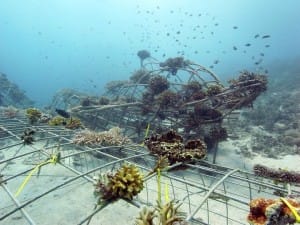 The Biorock system grows coral using underwater steel structures made of rebar on the seafloor that loose pieces of corals from the surrounding reefs are attached to. The structure is connected to a very low voltage of electricity to create an electrolysis effect that stimulates coral growth up to six times faster than its normal rate, perfect for the depleted reef areas off of Trawangan.
The Biorock system grows coral using underwater steel structures made of rebar on the seafloor that loose pieces of corals from the surrounding reefs are attached to. The structure is connected to a very low voltage of electricity to create an electrolysis effect that stimulates coral growth up to six times faster than its normal rate, perfect for the depleted reef areas off of Trawangan.
Funded by local businesses, rare government grants and a “First Dive Tax” of Rp.50,000 on everyone’s first dive in Gili Keeping Paradise A Paradise Trawangan, the GET and its Biorock coral regrowth system has a solid support group and the results are showing. Speaking from the front lines, Delphine reports that “A few reefs have recovered and you can notice it by the fields, or patches, of corals covering the seabed instead of the coral rubble before.
On reefs with a slope the corals roll and die with the water movement as they can’t cement in place as the seabed is unstable. In protected areas with flatter bottoms, you can see a faster recovery of the corals, especially in the Biorock dive site in the southeast part of Trawangan where before nobody would dive and now everyone dives it and enjoys it. We will continue Biorock programs in needed areas where businesses are willing to provide the electricity to protect, restore and conserve the offshore reefs for a sustainable future.”
Another of the GET’s latest campaigns for the sea is working with Project Aware and Aquatic Alliance in nearby Tanjung Luar fish market to find alternative solutions to the killing of sharks and manta/mobula rays for their fins and gills.
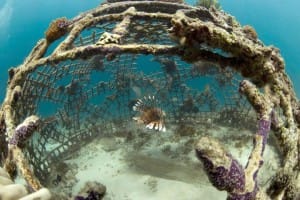 The GET has existed since 2001 but with Delphine’s involvement in 2004 was when the Biorock program got its real start. Being blonde and not speaking Bahasa Indonesia did feel like a big barrier to getting her message across at first, but the locals were already on a similar page with a youth collective patrol team (SATGAS) that started in 1999 that was being supported by local dive shops to find and stop dynamite fishermen from ruining the reefs further.
The GET has existed since 2001 but with Delphine’s involvement in 2004 was when the Biorock program got its real start. Being blonde and not speaking Bahasa Indonesia did feel like a big barrier to getting her message across at first, but the locals were already on a similar page with a youth collective patrol team (SATGAS) that started in 1999 that was being supported by local dive shops to find and stop dynamite fishermen from ruining the reefs further.
The GET was then formed by the local dive shops to help fund the SATGAS patrols and later on it would become involved in even more projects like Biorock with growing support and Delphine on board. Over the years Delphine would learn Indonesian and also how to run such an environmental program in a country that was very new to her. Eventually the local businesses, people, and even the regional government would support and trust her, allowing Delphine to educate on and implement coral regrowth and other eco-projects on Gili Trawangan.
The bottom line is that tourism on Gili Trawangan is booming. With each new boat comes more visitors, more divers and more funds being injected into the holiday island. On the flipside this also brings with it more development and more rubbish. Like most of Indonesia the locals on Trawangan burn their trash, often times plastic included. To help avoid this Delphine says, “I am insisting on No Plastic Bags. We are constantly distributing free reusable bags at the markets, mosques and schools. Sometimes I feel like the eco police as people try to behave when they see me coming, but if that is the way they will turn it into a habit, then why not!”
“They (the locals) trust me now,” she furthered. “It took a while but as I said, I didn’t leave and I didn’t give up, and I learned not to shout and be polite in respect of their culture and their different way of doing things.”
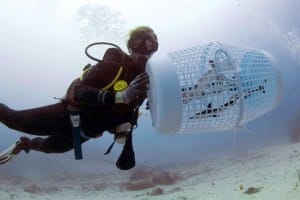 With this local trust and backing, the GET has not only regrown Trawangan’s coral reefs but is very active on land too. To date the GET has installed 1,000 trash bins on all three Gili Islands and has created a waste sorting and recycling program that reuses plastics, paper and metals, composts natural trash, and creates tetra bricks from waste to send back to Bali for further use by enviro-partners Eco Bali. At local schools the children are educated on the importance of proper waste disposal. Best of all, every first Friday of the month is a community clean up day held by the local dive shops, school and FMPL (island waste collection and treatment program), and tourists are encouraged to join with the option of a free dive for helping out.
With this local trust and backing, the GET has not only regrown Trawangan’s coral reefs but is very active on land too. To date the GET has installed 1,000 trash bins on all three Gili Islands and has created a waste sorting and recycling program that reuses plastics, paper and metals, composts natural trash, and creates tetra bricks from waste to send back to Bali for further use by enviro-partners Eco Bali. At local schools the children are educated on the importance of proper waste disposal. Best of all, every first Friday of the month is a community clean up day held by the local dive shops, school and FMPL (island waste collection and treatment program), and tourists are encouraged to join with the option of a free dive for helping out.
Anyone who has visited the Gilis knows that there are no cars or motorbikes and only bicycles and horses for transport. This is part of the Gili charm, but when mistreatment and sickness made Gili horses live only several years versus the 25 long years they should be, tourists started to take note and wrote concerned letters to the Jakarta Animal Aid Network (JAAN).
This sparked a visit to Trawangan and program set up by JAAN that is run by the GET that offers a free horse clinic every month for checkups. The biggest problem with the horses was a lack of fresh water and fatigue, but after three years of clinics and education it is evident that owners are giving their horses more fresh water and taking care of them. Cats are taken care of too with a free sterilization clinic every six months.
Indonesia is a beautiful part of the world although it does have its issues just like anywhere else. Thankfully there are people like Delphine out there who take the initiative and time to help out the situation rather than just stare and comment about it. It’s all about doing your part and being part of the solution to keep paradise a paradise.
To find out more about Delphine Robbe and the Gili Eco Trust go to: www.giliecotrust.com




